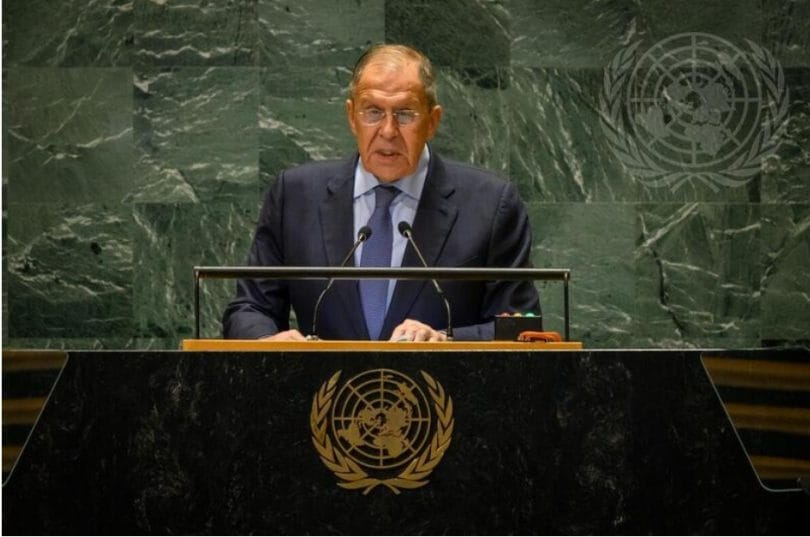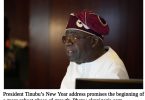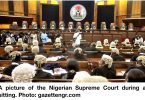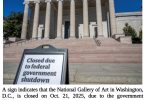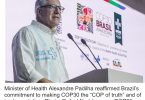Russia’s Foreign Minister Sergey Lavrov stood before the United Nations General Assembly on Saturday, delivering a speech with pointed critiques of the West, condemnations of perceived provocations, and stark warnings about the growing risks of nuclear confrontation. Lavrov’s address, delivered during the 79th session of the U.N. General Assembly, came on the heels of a shift in Russia’s nuclear doctrine articulated by President Vladimir Putin earlier in the week. Lavrov, one of Putin’s most trusted diplomats, painted a grim picture of escalating tensions, blaming the West for pushing the world toward a catastrophic outcome.
“I’m not going to talk here about the senselessness and the danger of the very idea of trying to fight to victory with a nuclear power, which is what Russia is,” Lavrov declared, his tone sombre yet resolute. These words were not merely rhetorical posturing; they underscored Russia’s belief that its security is increasingly at risk as Ukraine and its Western allies push forward in the ongoing conflict that has gripped Eastern Europe since February 2022.
Three days before Lavrov’s address, Putin had indicated a shift in Russia’s nuclear stance, hinting that the threshold for using nuclear weapons could be lowered. This adjustment is widely seen as a veiled threat to Western nations, particularly the United States and its NATO allies, who have been providing military aid to Ukraine. In his speech, Lavrov accused the West of using Ukraine as a pawn in a larger geopolitical game aimed at weakening and “strategically defeating” Moscow.
The Specter of Nuclear War
The possibility of a nuclear clash has loomed over the Russia-Ukraine conflict since its inception. Shortly before launching the invasion, President Putin reminded the world of Russia’s status as “one of the most powerful nuclear states,” putting the nation’s nuclear forces on high alert soon afterwards. In the two and a half years since Putin’s rhetoric regarding nuclear weapons has fluctuated, shifting between implicit threats and measured restraint. Last Wednesday, Putin’s message was clear: if Russia is attacked by any country that enjoys the support of a nuclear-armed power, it would consider this a joint attack.

This shift in rhetoric is particularly concerning as Ukrainian forces continue to target Russian territories with missiles and drones. Meanwhile, Western nations, particularly the United States, continue to supply Ukraine with increasingly sophisticated weaponry, though so far refraining from providing the long-range weapons that President Volodymyr Zelenskyy has sought. The Biden administration recently announced an additional $2.7 billion in military aid for Ukraine, but the package did not include the type of long-range arms that might directly target Russian soil—perhaps a calculated move to avoid further provocation.
Lavrov, speaking at a news conference after his U.N. address, emphasised that Russia would be watching the decisions of Western nations closely, especially with regard to their willingness to provide Ukraine with long-range capabilities. “Whether or not they will provide the permission for Ukraine for long-range weapons, then we will see what their understanding was of what they heard,” he said, leaving a chilling ambiguity around Russia’s potential response.
Dismissing Ukraine’s Peace Proposal
Lavrov also dismissed President Zelenskyy’s “peace formula” as a “doomed ultimatum.” Zelenskyy has been calling for a peace plan that includes several key elements: the complete expulsion of Russian forces from Ukrainian territory, accountability for alleged war crimes, and the release of prisoners of war, among other conditions. For Russia, these demands amount to nothing less than an unconditional surrender, and Lavrov’s derisive response makes it clear that Moscow sees no value in engaging with such terms.
Instead, Lavrov turned his attention to a separate peace initiative by China and Brazil, which proposes a peace conference involving Ukraine and Russia. The initiative, supported by a group of “friends for peace” consisting primarily of African and Latin American nations, aims to end the conflict without expanding the battlefield or further escalating the violence. Lavrov signalled Russia’s willingness to support this effort but stressed that any peace proposal must be grounded in “realities” and not “abstract conversations.”
Resolving the conflict hinges on fixing its root causes,” Lavrov said, pointing to what he claimed was the Kyiv government’s suppression of Russian speakers in eastern Ukraine and NATO’s continued expansion into Eastern Europe. These points have been at the centre of Russia’s justifications for its actions in Ukraine, though Kyiv and its Western allies have consistently rejected them.

A Broader Critique of the West
Lavrov’s speech was not limited to the war in Ukraine. He used the opportunity to unleash a broader critique of the Western-dominated international order, calling out what he described as a hypocritical approach to global governance. Lavrov referenced the Summit of the Future, held earlier in the week, which he said was filled with “ambitious events” and “loud declarations” that would ultimately be forgotten, just like many other international initiatives before it.
He cited several historical examples to illustrate his point, including the 2003 U.S.-led invasion of Iraq, NATO’s intervention in Libya in 2011, and the support provided to Georgia during its conflict with Russia in 2008. In each case, Lavrov argued that Western powers acted in ways contradicting their commitment to peace and stability.
The Russian foreign minister also turned his attention to the ongoing Israel-Palestine conflict, expressing sympathy for the Palestinian people while condemning the recent surge of violence in Gaza as a “massive collective punishment.” Lavrov called for an immediate cessation of hostilities and a return to the goal of establishing an independent Palestinian state. His comments were an implicit rebuke to the United States, which has been Israel’s steadfast ally throughout the conflict.
Lavrov’s address touched on many topics, including the economic disparity between the Global North and the Global South. He accused Western nations of failing to deliver on their promises to help developing countries, pointing out the “empty promises” made at various international summits to fight poverty and inequality. According to Lavrov, the West continues to exploit the resources of the Global South while failing to honour commitments to sustainable development.
Lavrov also attacked the United Nations itself, accusing Western countries of trying to use the international body to serve their own “selfish ends.” He criticised what he described as a growing trend within the U.N. Secretariat to align with Western narratives, thereby undermining the principle of sovereign equality that lies at the heart of the U.N. Charter.
He called for reforms to the Secretariat’s staffing, pointing out that representatives from Western countries hold many key positions within the organisation. Lavrov’s remarks reflected a broader frustration within Russia—and indeed among many nations in the Global South—about the perceived dominance of Western powers in international institutions.
In a pointed rebuke, Lavrov argued that the U.N. needs to restore trust by adhering strictly to the charter principle of sovereign equality among states. “It is not too late to breathe new life into the United Nations,” Lavrov asserted, suggesting that the organisation must distance itself from what he described as the Western agenda and instead promote genuine, inclusive dialogue.
Calls for a Multipolar World Order
Central to Lavrov’s speech was the argument that the current world order, dominated by the United States and its allies, is no longer tenable. He painted a picture of a world shifting from unipolarity to a more equitable multipolar system, one in which regional powers and international alliances will play a larger role in decision-making.
“The Global South and East speak out their rights to full-fledged participation in decision-making processes all over the spectrum of the international agenda louder and louder,” Lavrov said. He cited the increasing influence of regional bodies such as the African Union, the Shanghai Cooperation Organization, and the Community of Latin American and Caribbean States (CELAC) as evidence of this shift. According to Lavrov, these organisations are laying the groundwork for a more balanced world order in which the interests of all nations are respected.
He also highlighted the growing influence of BRICS—a grouping of Brazil, Russia, India, China, and South Africa—as an example of a counterweight to Western-dominated forums such as the G7. Lavrov argued that these regional and international alliances provide a template for cooperation that is more inclusive and less beholden to the interests of a single hegemonic power.
A Chilling Warning
Lavrov concluded his address with a chilling warning: if the West continues on its current path of confrontation and hegemonic ambition, it will pay a high price. He reiterated that Russia is not seeking confrontation but is prepared to defend its interests, including through the use of nuclear weapons if necessary. “Security can either be equal and inseparable for all, or there will be no security for anyone,” Lavrov said, his message unmistakable.
Lavrov’s speech at the U.N. General Assembly was, in many ways, a microcosm of the broader geopolitical tensions that have gripped the world since Russia’s invasion of Ukraine. It reflected Moscow’s growing isolation from the West and its desire to build alliances in the Global South, even as it continues to push back against what it sees as Western encroachment on its sphere of influence.
The implications of Lavrov’s address are profound. By lowering the threshold for the use of nuclear weapons, Russia has added a dangerous new dimension to the conflict in Ukraine—one that could have ramifications far beyond Eastern Europe. As the world watches and waits, the question remains: can diplomacy prevail in the face of such deep divisions, or is the world hurtling towards an outcome that no one truly desires?
In the end, Lavrov’s message was as much a plea as it was a warning. He called for a return to the principles of the U.N. Charter, for genuine dialogue among nations, and for a world in which the interests of all are respected. Whether the international community will heed that call remains uncertain, but one thing is clear: the stakes could not be higher.


